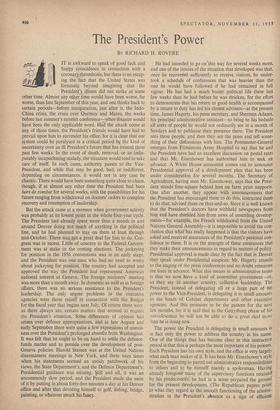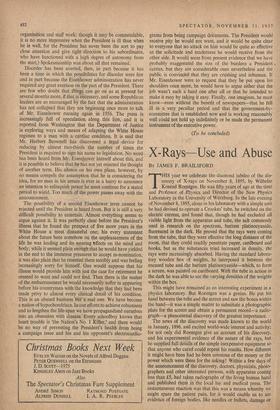The President's Power
BY RICHARD H. ROVERE IT is awkward to speak of good luck and happy coincidence in connection with a coronary thrombosis, but there is no escap- ing the fact that the United States was fortunate beyond imagining that the President's illness did not strike at some other time. Almost any other time would have been worse, far worse, than late September of this year; and one thinks back to certain periods—before inauguration, just after it, the Indo- China crisis, the crisis over Quemoy and Matsu, the weeks before last summer's summit conference—when disaster would have been the only applicable word, Had the attack come at any of those times, the President's friends would have had to prevail upon him to surrender his office, for it is clear that our system could be paralysed in a critical period by the kind of uncertainty over an ill President's future that has existed these past few weeks. In the event of death, removal, or an indis- putably incapacitating malady, the situation would tend to take care of itself. In such cases, authority passes to the Vice- President, and while that may be good, bad, or indifferent, depending on circumstances, it would not in any case be chaotic. There would have been something quite close to chaos, though, if at almost any other time the President had been hors de combat for several weeks, with the possibilities for his future ranging from withdrawal on doctors' orders to complete recovery and resumption of leadership., But the attack came at a moment when government activity was probably at its lowest point in .the whole four-year cycle. The President had already spent more than a month in and around Denver doing not much of anything in the political line, and he had planned to stay on there at least through mid-October. There was not a great deal for him to do. Con- gress was in recess. Little of concern to the Federal Govern. ment was at stake in the coming elections. The jockeying for position in the 1956 conventions was in an early stage, and the President was one man who had no need to worry about jockeying for position. The country had accepted and approved the way the President had represented American national interest at Geneva. The foreign ministers' meeting was more than a month away. In domestic as well as in foreign affairs, there was no serious resistance to the President's leadership. The only urgent problems in the executive agencies were those raised in connection with the Budget for the fiscal year that begins next July. Of course there were as there always are, certain matters that seemed to require the President's attention. Some differences of opinion had arisen over defence appropriations, and in late August and early September there were quite a few'expressions of uneasi- ness over the President's prolonged absente from Washington.
It was felt that he ought to be on hand to settle the defence- funds matter and to preside over the development of post- Geneva policies. Harold Stassen was at the United Nations disarmament meetings in New York, and there were times when his statements seemed an untidy patchwork of his views, the State Department's, and the Defence Department's; Presidential guidance was missing. Still and all, it was an uncommonly slow period, and the President made the most of it by putting in about forty-five minutes a day at his Denver office and after that devoting himself to golf, fishing, bridge, painting, or whatever struck his fancy. He had intended to go on*this way for several weeks more, and one of the ironies of the situation that developed was that, once he recovered sufficiently to receive visitors, he under- took a schedule of conferences that was heavier than the one he would have followed if he had remained in full vigour. He has had a much busier political life these last few weeks than he had before he was stricken, for the effort to demonstrate that his return to good health is accompanied by a return to duty has led his closest advisers—at the present time, James Hagerty, his press secretary, and Sherman Adams, his principal administrative assistant—to bring to his bedside all sorts of people he would not ordinarily see in a month of Sundays and to publicise their presence there. The President sees these people, and then they see the press and tell some- thing of their discussions with him, The Postmaster-General emerges from Fitzsimons Army Hospital to say that he and the President have had an excellent discussion on postal rates and that Mr. Eisenhower has authorised him to seek an advance. A White House economist comes out to announce Presidential approval of a development plan that has been under consideration for several months. The Secretary of Agriculture, having seen Mr. Eisenhower, says that the Presi- dent stands four-square behind him on farm price supports. One after another, they appear with announcements that the President has encouraged them to do this, instructed them to do that, advised them on thus-and-so. Since it is well known that the President's doctors have withheld newspapers from him and have shielded him from news of unsettling develop- ments—for example, the French withdrawal from the United Nations General Assembly—it is impossible to avoid the con- clusion that what has really happened is that the visitors have asked and received assurances of the President's perional con- fidence in them. It is on the strength of these assurances that they make their announcements in regard to matters of policy. Presidential approval is made clear by the fact that in Denver they speak under Presidential auspices; Mr. Hagerty attends to the staging of the press conferences and no doubt rehearses the lines in advance. What this means in administrative terms is that we now have a kind of committee government—or, as they say in another country, collective leadership. The President, instead of delegating all or a large part of his power to the Vice-President, is delegating it in small amounts to the heads of Cabinet departments and other executive agencies. And this promises to be the pattern for the next feW months, for it is said that in the Gettysburg phase of his ::onvalescence he will not be able to do a great deal more than he is doing now.
The power the President is delegating in small amounts is in fact only the power to address the country in his name. One of the things that has become clear in this instructive period is that this is perhaps the most important of his powers. Each President has his own style, and the office is very largely what each man makes of it. It has been Mr. Eisenhower's style from the beginning to parcel out administrative responsibilities to others and to be himself mainly a spokesman. Having already foregone many of the supervisory functions retained' by his predecessors, he had in a sense prepared the ground for the present development. (The Republican papers point to what they regard as the smooth functioning of the admini- stration in the President's absence as a sign of efficient organisation and staff work; though it may be commendable, it is no more impressive when the President is ill than when he is well, for the President has never been the sort to pay close attention and give tight direction to his subordinates, who have functioned with a high degree of autonomy from the start.) Spokesmanship was about all that remained.
Disorder has been averted, then, in part because it has been a time in which the possibilities for disorder were few and in part because the Eisenhower administration has never required any great exertion on the part of the President. There are few who doubt that things can go on as at present for several months more, if that is necessary, and some Republican leaders are so encouraged by the fact that the administration has not collapsed that they are beginning once more to talk of Mr. Eisenhower running again in 1956. The press is increasingly full of speculation along this line, and it is reported from Washington that the Department of Justice is exploring ways and means of adapting the White House regimen to a man with a cardiac condition. It is said that Mr. Herbert Brownell has discovered a legal device for reducing by almost two-thirds the number of times the President is required to sign his name to legislation. No word has been heard from Mr. Eisenhower himself about this, and it is possible to believe that he has not yet rejected the thought of another term. His silence on his own plans, however, by no means compels the assumption that he is considering the idea, for no man in his senses is ever in a hurry to announce an intention to relinquish power he must continue for a stated period to wield. Too much of the power passes away with the announcement.
The possibility of a second Eisenhower term cannot be rejected until the President is heard from. But it is still a very difficult possibility to entertain. Almost everything seems to argue against it. It was perfectly clear before the President's illness that he found the prospect of five more years in the White House a most distasteful one; his every statement about the future bore somehow on the unpleasantness of the life he was leading and its wearing tffects on the mind and body; while it seemed plain enough that he would have yielded in the end to the immense pressures to accept re-nomination, it was also plain that he resented them terribly and was feeling increasingly sorry for himself. One would suppose that his illness would provide him with just the case for retirement he seemed to want and could not find. Then there is the matter of the embarrassment he would necessarily suffer in appearing before his countrymen with the knowledge that they had been made privy to almost every clinical detail of his condition. This is an absurd business but a real one. We have become a nation of hypochondriacs. In our efforts to achieve robustness and to lengthen the life-span we have propagandised ourselves into an obsession with disease. Every schoolboy knows that heart trouble is 'the Nation's No. 1 Killer,' and there would be no way of preventing the President's health -from being a campaign issue and his and his opponent's electrocardio- grams from being campaign doCuments. The President would receive pity he would not want, and it would be quite clear to everyone that no attack on him would be quite so effective as the solicitude and tenderness he would receive from the other side. It would seem from present evidence that we have probably exaggerated the size of the burdens a President carries, but they are considerable ones nevertheless and the public is convinced that they are crushing and inhuman. if Mr. Eisenhower were to request that they be put upon his shoulders once more, he would have to argue either that the job wasn't such a hard one after all or that he intended to make it easy by taking it easy. Finally, one imagines, he must know—even without the benefit of newspapers—that he fell ill in a very peculiar period and that the givernment-by- committee that is established now and is working reasonably well could not hold up indefinitely or be made the permanent instrument of the executive power.
(To be concluded)



































 Previous page
Previous page